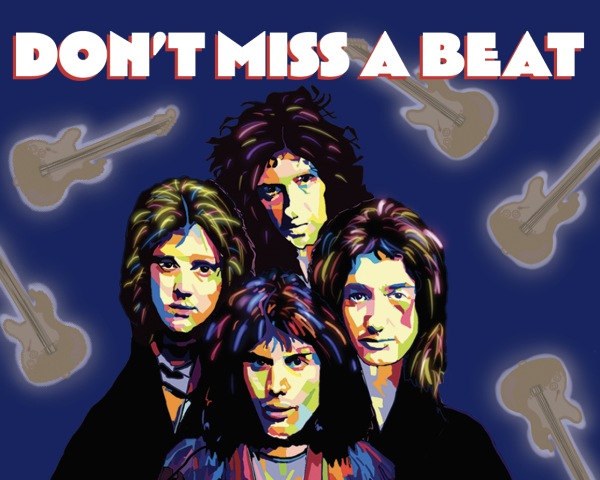Green Day’s Revolution Radio
C Mag reviews the iconic rock band’s 12th studio album, Revolution Radio.
It’s been a long time since Green Day has released a good album. If you were to talk to any fan, no matter how die-hard, they would likely agree that Green Day hasn’t released a complete record since 2004s “American Idiot.” They’ve tried to make good albums; disregarding these attempts would be unjust. Green Day has even come out with a couple of great songs since “American Idiot.” Their 2009 double album “21st Century Breakdown” includes some noteworthy jams such as the genre-flipping deepcut “Peacemaker” and the chart-topping single “21 Guns.”
Though the latter track may not have gained favorable reviews from the band’s fan base due to it’s undeniable pop appeal, I firmly believe that “21 Guns” perfectly demonstrates Billie Joe Armstrong’s impeccable song-crafting talents with vocals, guitar and songwriting. Despite these few gems, “21st Century Breakdown” overstays its welcome at almost 70 minutes of tracks. Even though there is a staggering amount of music on the album, there are only a few noteworthy and memorable tracks.
The band followed up “21st Century Breakdown” with an even more ambitious project in 2011-2012: “Uno,” “Dos” and “Tre.” This is not simply an album title but rather three album titles, all released within a few months of each other. The goal of the band was to step back from their rock opera style in order to create simple rock-and-roll, and a lot of it. The project as a whole hits a gargantuan 121:40 in length.
Though the sound of the trilogy is minimal compared to “21st Century Breakdown,” the whole project seems like a macrocosm of its predecessor: There are some great songs, but the excessive amount of filler makes the trilogy a chore to listen to all the way through. The lack of commercial and critical success of the trilogy seems to make Green Day’s mission clear for their eventual follow up: No more filler. The album needed to be concise. Whether or not the music needed to be ambitious in scope was up to them.
In my opinion, Green Day’s best music comes directly from Billie Joe’s heart. From the snot-nosed pop punk masterpiece that was “Dookie” to the ambitious political rock opera of “American Idiot” in 2004, Armstrong’s lyrics are direct, visceral and personal with strong concepts that materialize throughout each record. The argument can be made that what set Green Day’s inferior albums back was a lack of coherency in the tracks. So now, after all the trials and attempts to create a great album, Green Day released “Revolution Radio,” their 12th studio effort, on October 7th.
“Revolution Radio” plays how Green Day intended “21st Century Breakdown” to play following “American Idiot.” What do I mean by that? Well, for starters, the production of the album is almost robotically pristine. The guitars manifest a wall of crunch against crisp drums and the low ends of the bass. The acoustic guitars (which get the most play time on a Green Day album since 2001’s “Warning”) are full and bright, providing a soft cradle for Billie Joe Armstrong’s voice, which is caked in more post-production effects than any instrument.
Armstrong’s voice no longer possesses the same power it did through Green Day’s golden age. However, that’s not to say that his vocal skills haven’t improved. He still has the pipes, but the heaps of editing clearly in place prove that they aren’t nearly as powerful as they were ten or even twenty years ago. All this adds up to create a very clean production value to the album.
With the production only being utilized to clean up the sound of the album, the majority of judgement falls on the songs themselves, and how they stack up. They vary drastically in quality, but average out to a pretty decent batch of songs. The record’s high points include the bombastic pop rock ballad “Outlaws,” which employs the loud-soft dynamic better than any other song on the album. “Still Breathing” is inarguably the highlight of the record; its pop-appeal and earworm hooks make the song a dynamic and epic affair. The lyrics on the track provide tangible metaphors for the listener to relate to, and Billie Joe’s voice sounds pristine.
Coupled with these great tracks, however, is an overwhelming amount of material that leaves the listener unsatisfied. The vast majority of songs on this record aren’t objectively bad, but they aren’t very good either. Tracks like “Say Goodbye” and “Bouncing off the Wall” are the greatest offenders, coming off as so aggressively average and unmemorable that you forget them the moment they end. This is where this record suffers the most. These bland, generic pop punk tracks grow infuriating with multiple listens, and even the aforementioned good songs on the record feel tainted by their overpowering mediocrity.
“Revolution Radio” is a safe-bet for Green Day. They were clearly trying to strip the unneeded bells and whistles from their previous two releases in order to make a more straight-forward punk record, and, in that sense, they achieved their goal. But at the end of the day, “Revolution Radio” is lacking in innovation, takes no risks and left me feeling helplessly unsatisfied.






